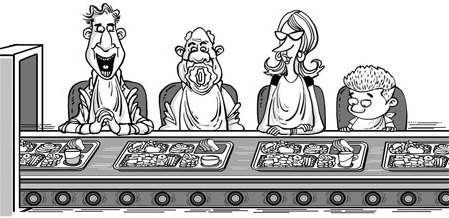
|
OPINION> Commentary
 |
|
At home or school, cooking isn't the same any more
By Katharine Whitehorn (China Daily)
Updated: 2008-07-31 07:30 Does cooking decline with age, like hearing and memory, or improve, like claret and stilton? As always, I find it hard to distinguish what is due to age itself, and what to having lived through certain decades and fashions. Those born before 1940 had a radically different approach to food. It was expected that school food would be foul. My mother went to a school where they would sing: "There is a happy school far far away/ where they have rotten eggs three times a day." It was a point of honor to loathe suet pudding or tapioca; there was none of this "Do you want muesli or toast for your breakfast? Or I could do you an egg". Those of us who were brought up to eat up what was put in front of us have an entirely different view from those who were born with a McDonald's hamburger in their mouths, let alone the planet-conscious little vegetarians who reject their grandmothers' roasts today. I suppose there was a time when all food came from a steaming kitchen: the excellence of food "like mother used to make" used to be taken for granted; things such as cornflour or gravy powder were advertised by showing a plump grey-haired matron smiling smugly from her stove. One forgets, and I don't at all mind forgetting, that in 1950 38 percent of women cooked - I mean cooked - three meals a day. And before fridges were at all common, you had to eat it all up in a day or two.  Even students got their food centrally, and the young and hard-up ate in boarding houses and endured the landlady's efforts, however dismal. Student food has always been pretty hit and miss. I remember being told of a dish called Gunge whose great advantage was that it tasted the same no matter what you put into it. And there usually wasn't anywhere sensible to keep food where it couldn't get mixed up with your pyjamas or your lipstick; when I was young, you couldn't pick up a pizza or a wrap. And now we eat all over the place, and in all sorts of ways. It took a complete shakeup of the traditional British way of eating to make singletons experiment with exotic cuisine in their flats, and it took the benign influence of Elizabeth David, plus all sorts of novelties coming in from America, to transform our ideas of what was good to eat. But it only took the birth of a child or two to reduce a woman's cooking to not much more than the ability to make immense vats of spaghetti sauce and sandwiches for eight in 10 minutes flat. My elder son wasn't keen on food at all until he went to school: then he came back and cheerfully described, as far as I could tell, only veg of some kind. Wasn't there any, you know, meat, fish, that kind of thing?" "There were round brown things," he said happily. Awful luncheon meat, I presume, but without the fatal sauce of motherly concern. Over the years I suppose we all compromise between what we can bear to cook and what the audience can bear to eat, and I confess that now I'm on my own I mainly eat leftovers and snacks. But when we have this handwringing about everybody getting too fat and throwing food away, I think we forget that part of the reason is simply that food is so easy. You don't have to shop every day, you stock up and shove it in the fridge; you just grope around a supermarket and pick up something that looks interesting or at least edible; you don't have to confront an actual butcher, red in tooth and saw, with all these intimidating haunches and bones, and if you do want porridge no one has to get up at dawn to cook it. Makes me feel exhausted just to think about the way it used to be - maybe I'd better have a snack. The Guardian (China Daily 07/31/2008 page9) |